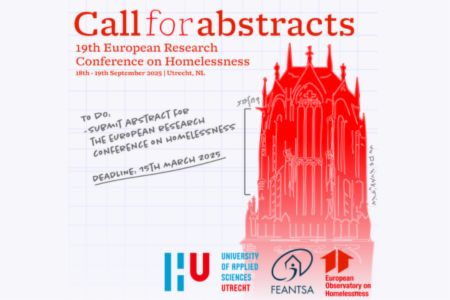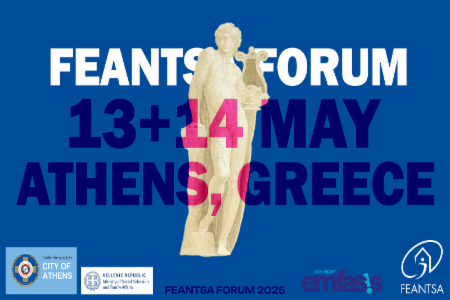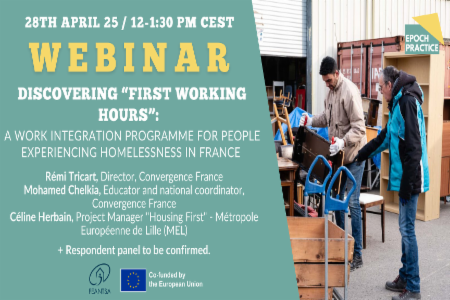
[Photo from the archive of Amsterdam art collective Rainbow Soulclub.
Free Advice performance by Rainbow Soulclub with Soulclub-member Roy Telgt]
The Arts & Culture: Creating forces for social change
Download the magazine here
For the last ten years, Europe has been the theatre of a social disaster, witnessing dramatic increases in housing exclusion and homelessness. Homelessness today affects all ages, all genders and all nationalities. Prolonged episodes of homelessness and the diversification of the profiles of those concerned reflect the dysfunctions inherent in our protection systems and housing markets. The pandemic has been accelerating the surge in people living in extreme poverty and dire living conditions.
In this context, people and support services are struggling to survive. Vital needs, such as access to accommodation, food and healthcare, are prioritized. But people living in poverty and experiencing exclusion often suffer from social isolation, poor physical and mental health, and a lack of autonomy: people with multiple needs should be supported through multiple solutions from the start.
Participation in cultural life and access to creation are fundamental rights, enshrined in several international and European courts, including the Covenant on Economic, Social and Cultural Rights (ICESCR), article 15, according to which “everyone must be able to express themselves, create and distribute their works in the language of their choice”, and the UNESCO Universal Declaration on Cultural Diversity, article 5: “everyone must be able to participate in the cultural life of their choice and exercise its own cultural practices.”
Many projects fostering the access to art and creation for people in a situation of exclusion have been flourishing at local level across Europe for decades. Some of these projects are presented here, demonstrating that beyond representing a fundamental human right, arts and creativity can also promote well-being, strengthen social networks, challenge public perceptions, and empower people to have their voices heard. As aptly stated by Skåne Stadsmission, who developed The Creative Workshop in Sweden: “By participating in the work of the creative workshop, an opportunity arises to be acknowledged and appreciated as something other than a social problem, something that many of our participants are otherwise defined as.”
What is art? What is creativity? The definitions here are different from one article to another. Some projects aim to create social change,
improve employability, strengthen social inclusion, or build advocacy to change public perception around exclusion. Others are based on arts and creativity as ways to decompartmentalize approaches and support practices, to introduce horizontal modes of support, and to empower people by simply proving that they can be artists and creators.
Access to art and creation is not commonly a priority when it comes to building a plea for better consideration of the human rights of people experiencing exclusion or homelessness. However, arts and creativity have a real impact on one’s recovery or inclusion process as well as on social and cultural structures.
At European level, opportunities for exchanging practices and building up successes from those kinds of projects are starting to appear: a European partnership between FEANTSA, Fondation Abbé Pierre and several structures presented in this edition of the magazine is currently under construction. Moreover, FEANTSA is now an official partner of the New European Bauhaus, a creative and interdisciplinary initiative driven by the European Commission aiming at “convening a space of encounter to design future ways of living, situated at the crossroads between art, culture, social inclusion, science and technology.”
Let us come together, as Arts and Homelessness International invite us to do, “to use creativity to help each other thrive, not just survive.”
Articles
Editorial, by Chloé Serme-Morin
- The Rise of Creativity in the Homelessness Sector, by Matt Peacock and David Tovey, Arts & Homelessness International
- Unterdruck - Kultur von der Straße: Arts and Creativity as shared praxis to counteract exclusion, by Tanja Ehmann and Unterdruck - Kultur von der Straße e.V.
- Skåne Stadsmission’s creative workshop: Seeing conversation as a creative process, by Oskar Mörnerud, Johan Perna, Matilda Jägerdén
- The Rainbow Soulclub: In conversation with artists Saskia Janssen and George Korsmit, by Ellen ter Gast
- Wroclaw: A cradle of initiatives for intervention and integration, by Małgorzata Sieńczyk, Aneta Szarfenberg, Dariusz Dobrowolski, Maciej Gudra, Andrzej Ptak
- The Homeless Film Festival: Raising awareness about the situation of people experiencing homelessness, by Alberto Gaston, Emaus Solidarité/Homeless Film Festival
- Hear my voice: the role of the High Hopes Choir in tackling social exclusion, Glenn Alexander, Managing Coordinator, High Hopes Choir
- CAIS Recicla: We transform everything - lives, first of all, by Nuno do Carmo, Coordinator of Centro CAIS Porto and manager of CAIS Recicla
- C’est pas du luxe ! (This is no luxury!): Access to and empowerment through cultural activity, by Sibylle Arlet & Florine Siganos, Fondation Abbé Pierre
- The New European Bauhaus: The crossroad where arts and housing affordability must meet, by Sorcha Edwards, Secretary General, Housing Europe





